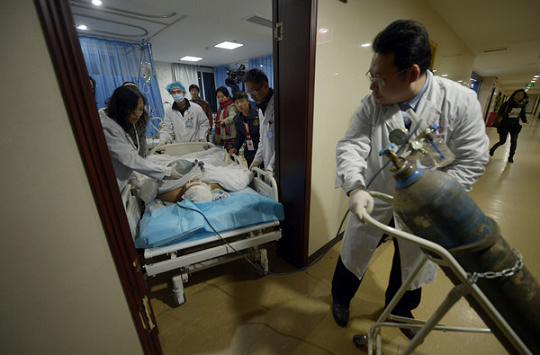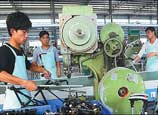
 |
| Wang Qingyong, a migrant worker from Jiangsu province, is rushed into surgery in Chongqing on Jan 19. Wang died and his family agreed to donate his organs. (CHINA DAILY) |
China aims to expand its pilot organ donation network nationwide by the end of the year.
Zhao Baige, executive vice-president of the Red Cross Society of China, said on Monday that it will urge all provinces and regions not covered by the program to add it by the end of the year.
Led by the Ministry of Health and the society, the organ donation program aims to establish viable systems to share the information of deceased organ donors and people waiting for donations, and to match donations between the two across the country.
The pilot program began in March 2010, and 19 provinces have adopted it. The Red Cross branches in these provinces have set up offices to advocate the importance of organ donation and staying connected with local hospitals for potential donors.
The offices discover potential organ donors, communicate with them or their family members to get their permission to donate and witness the procurement of organs, before they are automatically assigned on China Organ Transplant Response System, an online system designed by the Ministry of Health, to patients in 164 hospitals nationwide.
As of Feb 22, the 19 provinces have procured 1,804 organs from 659 dead donors, Zhao said.
"The figure is the result of a cautious pilot in limited hospitals," said Huang Jiefu, vice-minister of health and one of the leading advocates for the program.
Huang said there will be more donations when the program goes nationwide and there are specific legal stipulations regarding organ donations.
"It's estimated that when the program is implemented nationwide, people on the waiting list for organ transplant will reach 300,000, but currently we are only able to do 10,000 transplants (a year), and the ratio between people on the waiting list and transplants is 30:1," Huang said.
"Every year there are 154,000 potential donors in the ICUs in China, of which 50 percent are from top grade-three hospitals. As long as we do our work solid there, we can have at least 40,000 donors and 110,000 organs donated every year. The ratio will be 3:1."
Social organizations such as the Red Cross Society of China should play a bigger role in facilitating organ donations, Huang said.
In January, the society established the China Human Organ Donation Management Center, which will not only promote organ donations and discover potential donors, but also run the national organ sharing system and distribute organs, Huang said.
By the end of the year, the Red Cross Society of China will establish an online nationwide system documenting people who are willing to donate their organs after they die. The system will spot potential donors and request their consent before matching them with people on the waiting list.
















 China's 'leftover women' phenomenon arouses heated debate in West
China's 'leftover women' phenomenon arouses heated debate in West


![]()
